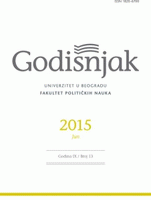Izbori za Evropski parlament 2014. godine – korak ka evoluciji institucionalnog sistema Evropske unije
Elections To The European Parliament In 2014 — A Step Towards The Evolution Of Institutional System Of The European Union
Author(s): Slobodan ZečevićSubject(s): Politics / Political Sciences
Published by: Fakultet političkih nauka Univerziteta u Beogradu
Keywords: European Parliament elections; the Commission; the President of the Commission; the European Council; democratic legitimacy; caucus; the federation of European political parties; clusters
Summary/Abstract: Elections to the European Parliament in May 2014, are important event in the development of the European Union. European political parties represented in the European Parliament for the first time on the eve of the parliamentary election pre-emphasized its candidate for President of the Commission. The European Parliament is the European Council failed to impose candidacy Jean-Claude Juncker for President of the Commission, as the leader of the federation center-right parties that won the most votes in the parliamentary election. The fruit of the election process for members of the European Parliament in 2014 increased personalization in the selection and strengthened the political authority of the President of the Commission as a first step in the further evolution of the institutional system of the European Union. Increased the authority of the president led to the birth of a new organizational architecture of the body in the form of “clusters.” Manner in which took place the European parliamentary elections in 2014 actually contributes to the growing influence of transnational and democratic institutions within the institutional system of the European Union.
Journal: Godišnjak FPN
- Issue Year: 2015
- Issue No: 13
- Page Range: 101-115
- Page Count: 15

